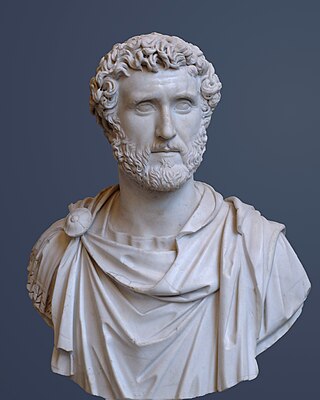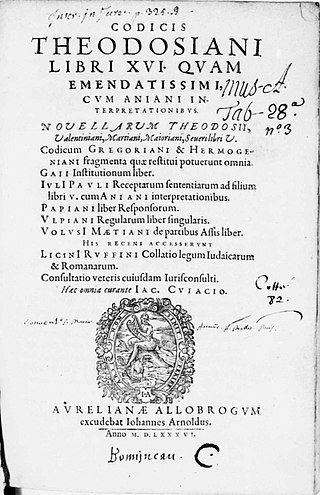Related Research Articles

Antoninus Pius was Roman emperor from 138 to 161. He was the fourth of the Five Good Emperors from the Nerva–Antonine dynasty.

Marcus Aurelius Antoninus was Roman emperor from 161 to 180 AD and a Stoic philosopher. He was the last of the rulers known as the Five Good Emperors, and the last emperor of the Pax Romana, an age of relative peace, calmness and stability for the Roman Empire lasting from 27 BC to 180 AD. He served as Roman consul in 140, 145, and 161.

Lucius Aurelius Verus was Roman emperor from 161 until his death in 169, alongside his adoptive brother Marcus Aurelius. He was a member of the Nerva-Antonine dynasty. Verus' succession together with Marcus Aurelius marked the first time that the Roman Empire was ruled by multiple emperors, an increasingly common occurrence in the later history of the Empire.

Quintus Lollius Urbicus was a Numidian Berber governor of Roman Britain between the years 139 and 142, during the reign of the Emperor Antoninus Pius. He is named in the Historia Augusta, although it is not entirely historical, and his name appears on five Roman inscriptions from Britain; his career is set out in detail on a pair of inscriptions set up in his native Tiddis near Cirta, Numidia.
Marcus Statius Priscus Licinius Italicus was a Roman senator and general active during the reigns of Hadrian, Antoninus Pius, and Marcus Aurelius. Contemporary sources refer to him as Marcus Statius Priscus or simply Statius Priscus. He was consul for the year 159 as the colleague of Plautius Quintillus; Priscus was one of only two homines novi to attain the ordinary consul in the reigns of Antoninus Pius and Marcus Aurelius.

Lucius Volusius Maecianus was a Roman jurist, who advised the Emperor Antoninus Pius on legal matters, as well educating his son the future Marcus Aurelius in the subject. Originally of the equestrian class, Maecianus held a series of imperial offices culminating with prefect of Egypt in 161, when Marcus Aurelius adlected him inter praetorios, or with the rank of praetor, into the Roman Senate. Maecianus was suffect consul in an undetermined nundinium around AD 166.

The reign of Marcus Aurelius began with his accession on 7 March 161 following the death of his adoptive father, Antoninus Pius, and ended with his own death on 17 March 180. Marcus first ruled jointly with his adoptive brother, Lucius Verus. They shared the throne until Lucius' death in 169. Marcus was succeeded by his son Commodus, who had been made co-emperor in 177.
Marcus Petronius Mamertinus, possibly known as Sextus Petronius Mamertinus, was a Roman senator originally of the Equestrian order. He served as suffect consul in 150 AD as the colleague of Marcus Cassius Apollinaris.
Marcus Mettius Rufus was a Roman eques who flourished during the reign of the emperors Domitian and Trajan. He was appointed to a series of imperial offices, including praefectus or governor of Roman Egypt.
Marcus Gavius Maximus was an eques of ancient Rome who held several imperial positions, both civil and military, under Hadrian and Antoninus Pius.
Quintus Baienus Blassianus was a Roman eques who held a number of military and civilian positions during the reign of the Emperors Antoninus Pius and Marcus Aurelius, including praefectus of the Classis Britannica, and of Roman Egypt.
Lucius Valerius Proculus was a Roman eques who held a number of military and civil appointments during the reigns of the Emperors Hadrian and Marcus Aurelius. He is known primarily from inscriptions and non-literary papyrus.
Marcus Bassaeus Rufus was a Roman senator, who held a number of appointments during the reigns of the emperors Antoninus Pius, Marcus Aurelius and Commodus. The most notable of these were praefectus vigilum, praefectus or governor of Roman Egypt, and praetorian prefect.
Titus Furius Victorinus was a Roman eques who held a number of appointments during the reigns of the Emperors Antoninus Pius and Marcus Aurelius. The most prominent of these offices were praefectus vigilum, praefectus or governor of Roman Egypt, and praetorian prefect.
Claudius Julianus was a Roman eques and jurist who held a number of military and civilian positions during the reign of the Emperor Septimius Severus, most importantly praefectus or governor of Roman Egypt. His relationship to other Claudii Juliani is unknown.
Tiberius Claudius Secundinus Lucius Statius Macedo was a Roman eques who held a number of appointments in the second century AD, the best known of which was praefectus annonae, or overseer of the food supply of Rome. Macedo is known only from a series of inscriptions.
Marcus Petronius Honoratus was a Roman eques who held a number of military and civilian positions during the reigns of the Emperors Hadrian and Antoninus Pius, which included praefectus annonae and praefectus or governor of Roman Egypt.

Lucius Julius Vehilius Gratus Julianus was a soldier and an eques who held a number of military and civilian appointments during the reigns of Marcus Aurelius and his son Commodus. Julianus received honors two separate times for his military service.
Quintus Marcius Dioga was a Roman eques who flourished during the reign of the emperor Septimius Severus and his sons. He was appointed to a series of imperial offices, including praefectus annonae,, and praefectus vigilum.
Claudius Athenodorus was a Roman eques who flourished during the reign of the emperor Domitian. He was appointed to a series of imperial offices, including praefectus annonae for the city of Rome.
References
- ↑ CIL III, 431 = ILS 1449
- ↑ IGR III.1077
- ↑ Marcus Aurelius, Meditations , VIII.25
- 1 2 Historia Augusta, "Hadrian", 15.1
- 1 2 Birley, Hadrian: the Restless Emperor (London: Routledge, 1997), p. 79
- ↑ Birley, Hadrian, p. 197
- 1 2 Pavis d'Escurac, La préfecture de l'annone, service administratif impérial d'Auguste à Constantin (Rome: Ecole française de Rome, 1976), p. 341
- ↑ Guido Bastianini, "Lista dei prefetti d'Egitto dal 30a al 299p", Zeitschrift für Papyrologie und Epigraphik , 17 (1975), p. 289
- ↑ Oxyrhynchus Papyri , 40. English translation in A. S. Hunt and C.C. Edgar, Select Papyri, II. Non-literary Papyri. Public Documents (London: Loeb, 1932), pp. 168-171
- ↑ Sammelbuch 4284. English translation in Napthtali Lewis, Life in Egypt under Roman Rule (Oxford: University Press, 1983), p. 181